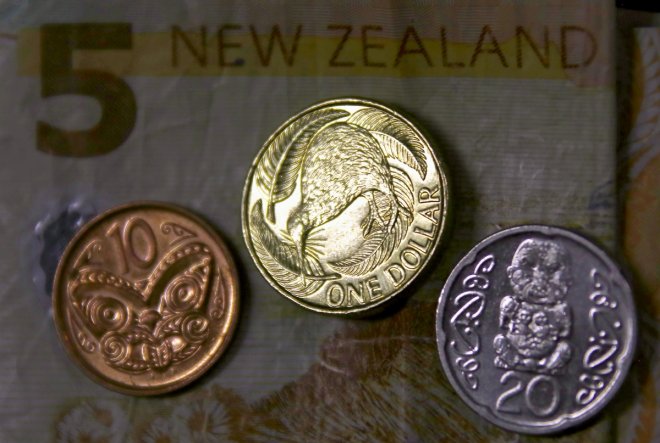
The New Zealand dollar fell to a 2-week low against the US dollar while shares rallied on Thursday (Feb 9) as the Reserve Bank Of New Zealand said the local currency's exchange rate is higher than is sustainable for balanced growth.
The RBNZ has left the official cash rate unchanged at 1.75% at the policy decision on Thursday as expected.
NZD/USD dropped to a low of 0.72210, its lowest since 24 Jan and down 0.5% down on the day. So far this week, the kiwi dollar has weakened 1.3% against the greenback, moving off a multi-month high touched on Feb 7.
NZ50, the main share index, was up 0.63% on the day at 9:50 AM Singapore Time when Nikkei 225 was down 0.44% and Australia's AORD down 0.2%.
Against the euro, the kiwi dollar weakened to 1.4801 from previous close of 1.4722, further moving off the multi-month high of 1.4535 hit earlier this week.
The RBNZ said inflation has returned to the target band as past declines in oil prices dropped out of the annual calculation, and is expected to return to the midpoint target of 2%, reflecting the strength of the domestic economy.
Governor Graeme Wheeler said New Zealand's financial conditions have firmed with long-term interest rates rising and continued upward pressure on the New Zealand dollar exchange rate.
"The exchange rate remains higher than is sustainable for balanced growth and, together with low global inflation, continues to generate negative inflation in the tradables sector. A decline in the exchange rate is needed," Wheeler said.
"Longer-term inflation expectations remain well-anchored at around 2%, the statement said.
Inflation had spiked to a three-year high of 1.3% in December quarter, driven by an upbeat housing market, as per the data released on 25 Jan.
The RBNZ said economic growth in New Zealand has increased as expected and is steadily drawing on spare resources.
"The outlook remains positive, supported by ongoing accommodative monetary policy, strong population growth, increased household spending and rising construction activity. Dairy prices have recovered in recent months but uncertainty remains around future outcomes," Wheeler said.
According to the RBNZ, the recovery in commodity prices and more positive business and consumer sentiment in advanced economies have improved the global outlook, too, although surplus capacity in the global economy and rising geo-political uncertainty are the negatives to watch out for.
"Global headline inflation has increased, partly due to rising commodity prices. Global long-term interest rates have increased. Monetary policy is expected to remain stimulatory, but less so going forward, particularly in the US."
The central bank said its monetary policy will remain accommodative for a considerable period as numerous uncertainties remain, particularly in respect of the international outlook, and policy may need to adjust accordingly.








